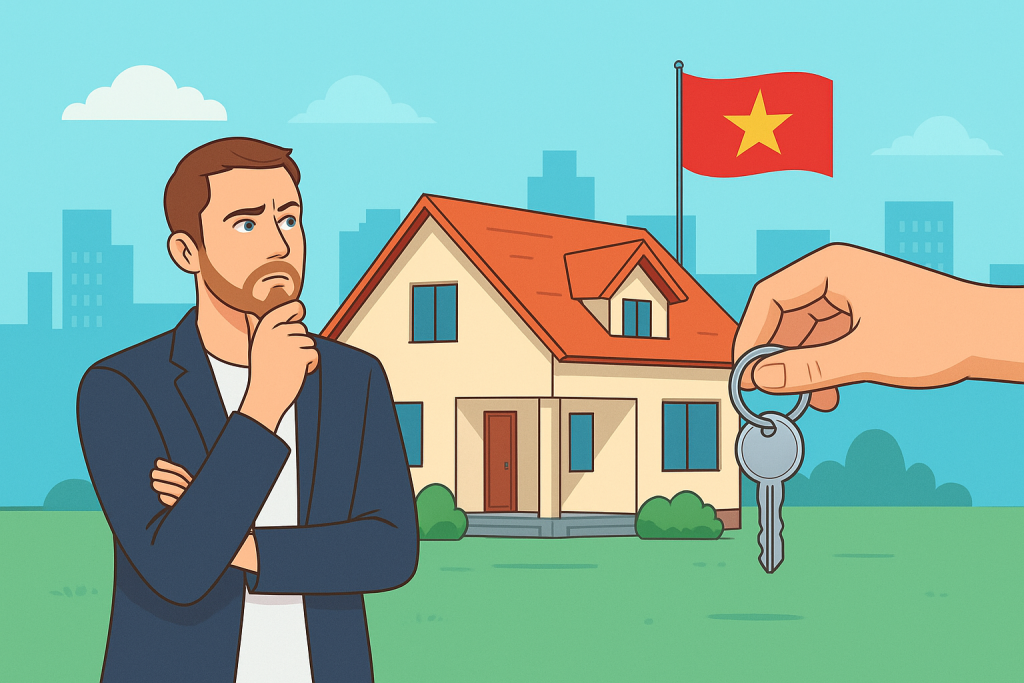
With the rise of globalization and international integration, Vietnam has become an increasingly attractive destination for foreigners to live, work, and invest. Along with that, the demand for home ownership by foreigners in Vietnam has grown significantly — especially in major cities such as Hanoi, Ho Chi Minh City, and Da Nang.
However, the right of foreigners to own houses in Vietnam is not absolute. It is strictly regulated by Vietnamese law, with specific conditions, limits, and legal implications. Understanding these legal boundaries is essential for individuals and foreign-invested enterprises engaging in Vietnam’s real estate market.
1. Legal Framework
Foreign ownership of residential property in Vietnam is governed by the following key legal instruments:
- Law on Housing (2023);
- Decree No. 95/2024/NĐ-CP guiding the implementation of the Law on Housing;
- Land Law (2024);
- Law on Real Estate Business (2023);
- Bilateral and international investment and cooperation agreements to which Vietnam is a party.
According to Article 17 of the Law on Housing (2023), foreigners are permitted to own residential property in Vietnam within defined limits, marking a shift away from the previous “total prohibition” approach.
2. Scope and Forms of Ownership for Foreigners
2.1. Permitted Forms of Ownership
Under Articles 17 and 18 of the Law on Housing (2023), foreigners may own residential property in Vietnam only through the following forms:
- Purchase, lease-purchase, inheritance, or donation of commercial residential property (apartments or detached houses) within approved housing projects — excluding areas restricted for national defense and security reasons;
- Investment in housing development projects for sale, lease, or lease-purchase in accordance with Vietnamese law;
- Foreigners are not permitted to purchase land or receive land-use rights, as land in Vietnam belongs to the entire people, with the State acting as the representative owner and unified manager.
2.2. Limitations on Quantity and Duration
Pursuant to Articles 19–20 of the Law on Housing (2023) and Article 5 of Decree 95/2024/NĐ-CP:
- Foreigners may own no more than 30% of the total number of apartments in a single condominium building;
- For detached houses (villas, townhouses) within a residential area or ward, foreigners may own no more than 250 houses;
- The maximum ownership period is 50 years from the date of issuance of the Certificate of Ownership, with the possibility of extension upon approval;
- If a foreigner marries a Vietnamese citizen, they may own residential property indefinitely, similar to Vietnamese citizens.
3. Key Restrictions and Potential Legal Risks
3.1. No Ownership of Land
Under the Land Law, foreigners can only own the house itself, not the underlying land. The land remains under state ownership. This distinction often complicates transactions such as transfers, mortgages, or inheritance.
3.2. Restricted Areas
The Ministry of National Defense and the Ministry of Public Security maintain lists of restricted zones where foreigners are prohibited from owning property due to national security concerns. In practice, some real estate transactions have been declared invalid because the property was located in restricted areas without prior notice to the buyer.
3.3. Limited Ownership Term
After the 50-year ownership term expires, foreigners must sell, donate, or transfer the property to an eligible party (e.g., a Vietnamese citizen or a domestic organization) unless an extension is approved. Failure to do so may result in the forfeiture of ownership rights.
3.4. Risks from Using a Vietnamese Nominee
Some foreigners attempt to bypass legal restrictions by asking Vietnamese individuals to hold property titles on their behalf. This “nominee arrangement” is illegal and extremely risky — in case of dispute, the Vietnamese titleholder may claim full ownership, and the foreigner has no legal protection under Vietnamese law.
3.5. Risks in Transfer and Inheritance
Property transfers, donations, and inheritances involving foreign owners must strictly comply with Vietnamese legal requirements. If the transferee is not eligible to own property in Vietnam, the transaction will be void.
4. Policy Recommendations and Practical Guidance
- Increase transparency regarding restricted zones to help foreigners and foreign-invested enterprises access official ownership information easily.
- Clarify procedures for ownership extension after 50 years to prevent loss of assets due to procedural uncertainty.
- Establish stronger controls against nominee arrangements and strictly penalize misuse of Vietnamese legal entities to circumvent ownership restrictions.
- Expand bilingual legal and notarial services to assist foreign buyers in understanding their rights and obligations before any transaction.
- Provide clearer guidance on joint ownership and property division for marriages between Vietnamese citizens and foreigners.
5. Conclusion
Allowing foreigners to own residential property in Vietnam reflects the country’s open-door policy toward integration and foreign investment. However, this right remains limited and regulated, balancing economic openness with national security and real estate market stability.
Foreigners may purchase and own commercial housing within approved projects, but cannot own land, must respect ownership caps, and are bound by the 50-year term limit unless extended.
Understanding and complying with Vietnam’s legal framework is the only way to protect lawful rights of foreign individuals and investors — while promoting a transparent, sustainable, and equitable real estate market in Vietnam.
📞 CONTACT LEGAL CONSULTANT:
TLA Law is a leading law firm with a team of highly experienced lawyers specializing in criminal, civil, corporate, marriage and family law, and more. We are committed to providing comprehensive legal support and answering all your legal questions. If you have any further questions, please do not hesitate to contact us.
1. Lawyer Vu Thi Phuong Thanh, Ha Noi Bar Association
Email: vtpthanh@tlalaw.vn
2. Lawyer Tran My Le, Ha Noi Bar Association
Email: tmle@tlalaw.vn
Khuong Ngoc Lan

